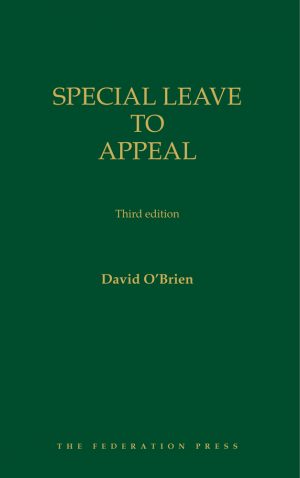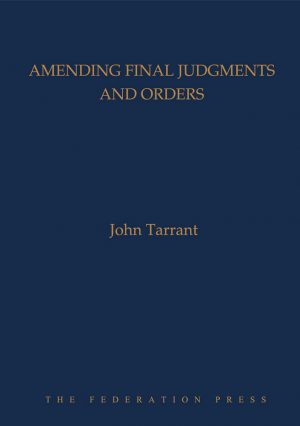Since its initial publication in 2012, Authority to Decide has established itself as the pre-eminent resource for Australian practitioners and courts dealing with questions of jurisdiction. It has been cited regularly in judgments of the High Court of Australia, and in dozens of first instance and appellate judgments of other courts. Some of the propositions advanced in the first edition have subsequently received judicial support, helping to shape the development of the law.
Each chapter in the second edition has been thoroughly updated to incorporate a wealth of new case law. The coverage of the work has also expanded. Highlights include:
- Updated analysis of the investment of jurisdiction by the Commonwealth cross-vesting legislation, including its effect in bankruptcy, the jurisdiction of State and Territory courts in “special federal matters” and a new section on appeals which lie from State and Territory courts to federal courts.
- Extensive analysis of developments in jurisdictional error, including the High Court judgments in Hossain and SZMTA.
- Updated analysis of “accrued jurisdiction” (a term deprecated by the High Court in Rizeq v Western Australia) and the nature of decisions affected by jurisdictional error (including by reference to New South Wales v Kable).
- New sections on the jurisdictions of the New South Wales Court of Appeal and Court of Criminal Appeal.
Authority to Decide enables the reader to gain a deep and nuanced understanding of the complex legal principles governing issues of jurisdiction. It engages with the academic literature, but at its heart it remains a very practical work, offering guidance both to practitioners seeking to invoke the jurisdiction of a court, and to the judges exercising it.
Preface
Table of Cases
Table of Statutes
1. The meanings of “jurisdiction”
1.1 Jurisdiction as authority to decide
1.2 Jurisdiction as the dispute, as opposed to the authority to decide it
1.3 The ambiguity of “federal jurisdiction”
1.4 Jurisdiction as a geographic area
1.5 Metonymous uses of “jurisdiction”
1.6 Overview of uses of “jurisdiction”
1.7 Broader uses of “jurisdiction”
2. Invoking the jurisdiction of courts
2.1 Introduction
2.2 Constitutional recognition of courts
2.3 Jurisdictional limitations on all courts
2.4 Superior courts of record
2.5 Jurisdiction to determine a court’s own jurisdiction
3. Jurisdictional error
3.1 Introduction
3.2 Why “jurisdictional error” is challenging
3.3 The entrenched minimum provision of judicial review
3.4 Identifying “jurisdictional error”
3.5 Jurisdictional facts
3.6 Other jurisdictional errors
3.7 The consequences of jurisdictional error
3.8 Limits on restricting review for jurisdictional error
3.9 Conclusion
4. Identifying Chapter III matters
4.1 Introduction
4.2 Summary
4.3 Justiciable controversies based on common transactions and facts
4.4 Application of the principles after the invalidity of the cross-vesting scheme
4.5 Discretion
4.6 Substantiality
4.7 “Accrued” jurisdiction
4.8 Associated jurisdiction
5. Conferring and excluding jurisdiction
5.1 Introduction
5.2 Overview
5.3 Types of laws conferring and excluding jurisdiction
5.4 General approach to construing laws conferring or excluding jurisdiction
5.5 The general conferral of jurisdiction in individual courts
5.6 General conferral and specific exclusion of jurisdiction
5.7 The general investment of jurisdiction by Judiciary Act s 39
5.8 Overriding the limits and conditions in Judiciary Act s 39
5.9 The Jurisdiction of Courts (Cross-vesting) Act 1988 (Cth)
5.10 Excluding the jurisdiction of State and Territory courts
5.11 Summary
6. Service
6.1 Introduction
6.2 Presence is sufficient to found personal jurisdiction
6.3 Exceptions – where local personal service is not effective
6.4 Voluntary submission
6.5 Substituted service
6.6 Extraterritorial service
6.7 Service and Execution of Process Acts
6.8 Service is jurisdictional
6.9 The position in the United States
6.10 Conclusion
7. Chapter III matters – private litigation
7.1 Introduction
7.2 “Arising under” – authority to decide federal questions
7.3 Matters arising under any treaty
7.4 Matters affecting consuls or other representatives of other countries
7.5 Matters between residents of different States
7.6 Matters of admiralty and maritime jurisdiction
7.7 Matters relating to the same subject matter claimed under the laws of different States
8. Chapter III matters – litigation involving governments
8.1 Introduction
8.2 Context
8.3 The drafting of ss 75 and 78 of the Australian Constitution
8.4 The effect of federation
8.5 Governmental amenability to suit
8.6 Jurisdiction over governments
8.7 Identifying a governmental party
8.8 Conclusion
9. Appeals
9.1 Introduction
9.2 The nature of appeals
9.3 Appellate or original jurisdiction?
9.4 History of appeals
9.5 Types of appeals
9.6 Legislation precluding or qualifying a right of appeal
Appendix 1
Chapter III of the Australian Constitution and Judiciary Act 1903 (Cth), selected provisions
Australian Constitution, Chapter III (extracts)
Judiciary Act 1903 (Cth) (extracts)
Index
This new edition of Authority to Decide … should be on the shelf of every barrister, and in the library of all law firms.
Lee Aitken, Honorary Associate Professor, The University of Queensland Law Journal, (2021) vol 40 no 1.
Read the full review.
Since its initial publication, the Honourable Justice Mark Leeming’s influential work has been cited in the reasons of the High Court and of appellate courts around the country. Having now received judicial support, this edition expands on the many technical points of law examined in its first edition to encompass significant developments in the field.
Eleanor Sondergeld, Queensland Lawyer, (2020) vol 38 no 1
Some text books, like Gurry’s Breach of Confidence, get cited so much they become the law. Authority to Decide is another case in point: many of the points in the first edition have now received judicial support from the High Court, such as avoidance of the term “accrued jurisdiction”, and cautioning against the wide use of the term “inherent jurisdiction”.
Justin Wheelahan, Victorian Bar News, (2020) issue 167.
Reviews of previous edition:
We have been remiss in not reviewing this little book earlier. Its subject matter is technical. The author in his preface rightly says that the book is written for the working lawyer. … it is certainly a great source of material to consult whenever one has a problem in this area. The book deals with a problem that has been more and more significant particularly in administrative law over the past decade.
This is a very learned tome and will be of great assistance to lawyers who need to venture into this technical area. Unfortunately in one sense, that may include all of us, as the problems of jurisdiction can affect even the apparently simplest piece of litigation.
Peter W Young, Australian Law Journal, (2015) March
This very useful work by the extremely talented Mark Leeming S.C considers many aspects of the concept of “jurisdiction” in the Australian legal setting. Its focus is on Federal jurisdiction and it contains lucid explanations of the concept of “matters” in the various senses in which that concept is used.
Queensland Law Reporter, (2013) February.








